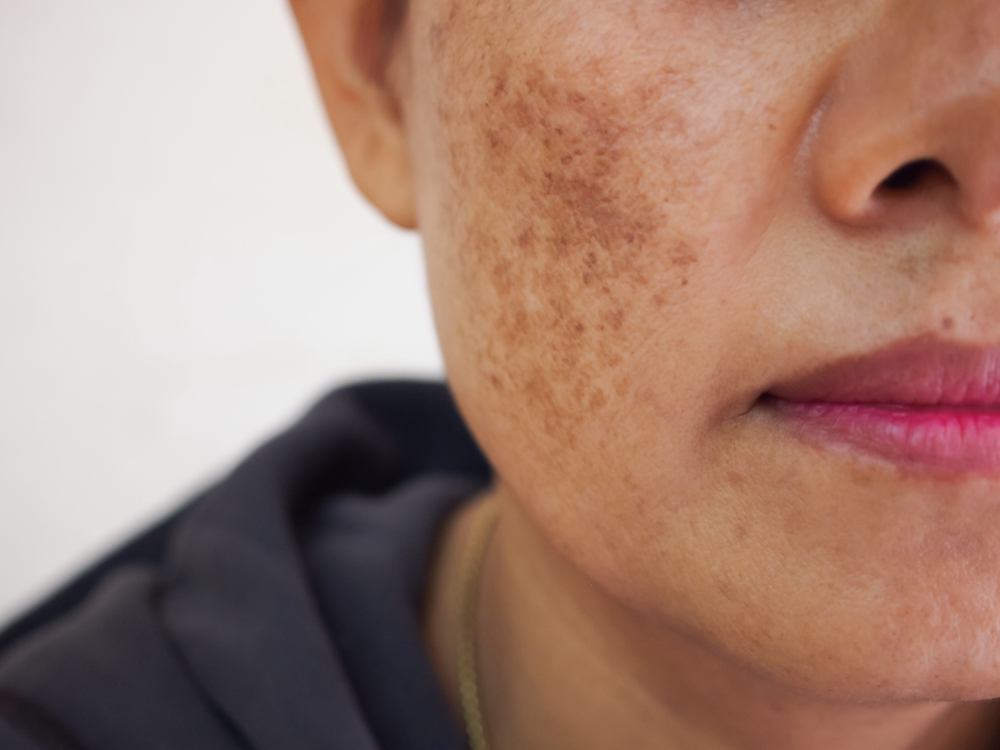Melasma and Hyperpigmentation: What’s the Difference?

Is melasma the same as hyperpigmentation? Both of these terms are frequently used to describe skin conditions that result in dark patches of the skin, especially on the face. But, are these two conditions the same thing? Are there different treatment options depending on the cause of the dark patches?
Dr. Straughn of Buckhead Dermatology in Atlanta and College Park has been treating melasma and hyperpigmentation in clients with darker skin tones for over 25 years. If you have dark patches on your skin that are bothersome, contact Buckhead Dermatology to schedule your appointment with our Atlanta-based, board-certified dermatologist today.
During your appointment, Dr. Straughn will provide you with an accurate diagnosis of your dark patches and get you on an effective treatment plan, helping you achieve the skin you desire.
Is melasma the same as hyperpigmentation?
Many people think of hyperpigmentation and melasma as two different skin conditions. Hyperpigmentation is a general term used to describe any skin condition that results in too much pigment in certain areas that develop into dark patches. There are a variety of skin conditions that fall under this term, including melasma.
What is melasma?
Melasma is a very common skin condition that affects more than 5 million people in the United States. Women and people with skin of color are more susceptible to developing melasma. The condition most commonly appears on the face, including the forehead, above the lip, on the chin and cheeks. The dark patches are typically symmetrical and can often look like a mask on the face, depending on the severity of the case. Melasma commonly happens in women due to hormonal changes during pregnancy, and is referred to as “the mask of pregnancy.”
Genetics play a role in the development of melasma. More women than men get the condition because of their naturally higher levels of estrogen. Women who take oral contraceptives and become pregnant have a higher risk of developing melasma. The condition is worsened by sun exposure.
Treatment Options for Melasma
If you have a severe case of melasma, it can be frustrating because it is difficult to treat and can take time. The good news is that it is not dangerous. Working with your dermatologist, you can reduce the appearance of the dark spots and learn what you can do to prevent new dark spots from emerging.
Topical Treatments
Certain ingredients found in topical creams can inhibit the production of melanin and encourage cell turnover. Look for products that contain hydroquinone or azelaic acid.
Chemical peels
Peels remove the top layers of the skin and can act to diminish the dark spots over time. Some peels may require a little downtime since the skin could peel off in layers after the treatment.
Micro-needling
Using very small needles to puncture the skin and encourage collagen production, micro-needling can also allow your skin care products to penetrate deeper into the skin and fade dark spots more quickly.
Avoid sun exposure
UV rays can make melasma worse. Protect your skin by wearing an SPF sunscreen daily, wearing sun-blocking clothing and avoiding direct exposure to the sun when possible.
What are other forms of hyperpigmentation?
There are other common forms of hyperpigmentation that are frequently seen in the dermatology office, including post-inflammatory hyperpigmentation and age spots.
Post-Inflammatory Hyperpigmentation
This form of hyperpigmentation typically occurs at the site of an injury or pimple. While the wound is in the process of healing, the body produces too much melanin which results in dark spots at the site. Post-inflammatory hyperpigmentation spots can last for a very long time, sometimes even years, if not given any intervention.
Age Spots
As you age, you can become more susceptible to developing dark spots due to too much exposure to the sun. While they are commonly called age spots and found in older people, they are also known as sun spots or liver spots and can develop in younger people too. They typically appear on areas of the body that receive extensive sun exposure, such as the tops of the arms, face, hands or back of the neck.
Atlanta Melasma and Hyperpigmentation Dermatologist
If you are experiencing melasma, age spots, post-inflammatory hyperpigmentation, dark spots or any other type of skin pigmentation condition, schedule an appointment at Buckhead Dermatology today. Dr. Straughn has extensive experience in treating patients with darker skin tones who want to clear their hyperpigmentation.
